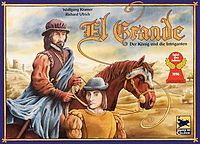
- Tabletop games
- Board games
- Tile-based games
- Turn-based games.html
- Abstract strategy games
- card games
- Connection games
- Mancala games
- Paper-and-pencil games
- Word games




Box cover of El Grande
|
|
| Players | 2-5 |
|---|---|
| Age range | 12 and up |
| Playing time | 90 minutes |
| Random chance | Low |
| Skill(s) required | Strategy |
El Grande is a German-style board game for 2-5 players, designed by Wolfgang Kramer and Richard Ulrich, and published in 1995 by Hans im Glück in German, by Rio Grande Games in English, and by 999 Games in Dutch. The game board represents renaissance-era Spain where the nobility (the Grandes) fight for control of the nine regions. El Grande was awarded the Spiel des Jahres prize and the Deutscher Spiele Preis in 1996.
The game is played in nine rounds. Three of these (rounds 3, 6, and 9) are scoring rounds, when player scores are counted according to their positions within the various regions. When the game is played with two players, it can be rather fast-paced. If five players participate, the game becomes very complex and challenging, as it becomes almost impossible to "do the mathematics" on the regions, and players team up and compete to keep others from winning, or to score more points for themselves.
There are no dice in the game, and players have many chances to influence the turn order. Thus the game is all about decisions. Often the path to scoring more points is clear, but sometimes it can be wiser to prevent opponents from scoring.
The original game has a number of action cards that are turned up each turn, which is the only source of randomness in the game. However, the effect of this luck is very small, since these cards are potentially available to be used by any player in the game.
Each player starts the game with a hand of identical cards (numbered 1-13) at the beginning of the game. These cards are used to bid for turn order. The person who plays the highest card chooses their action card first, etc., but each player may use each card only once in a given game.
The main challenge of the game is keeping track of the many factors that determine the balance of power in the regions and the score track.
Christian T. Petersen comments: "El Grande showed me the surprising depth that could be achieved by interlocking simple mechanisms - the principle that lies at the heart of the German school of design."